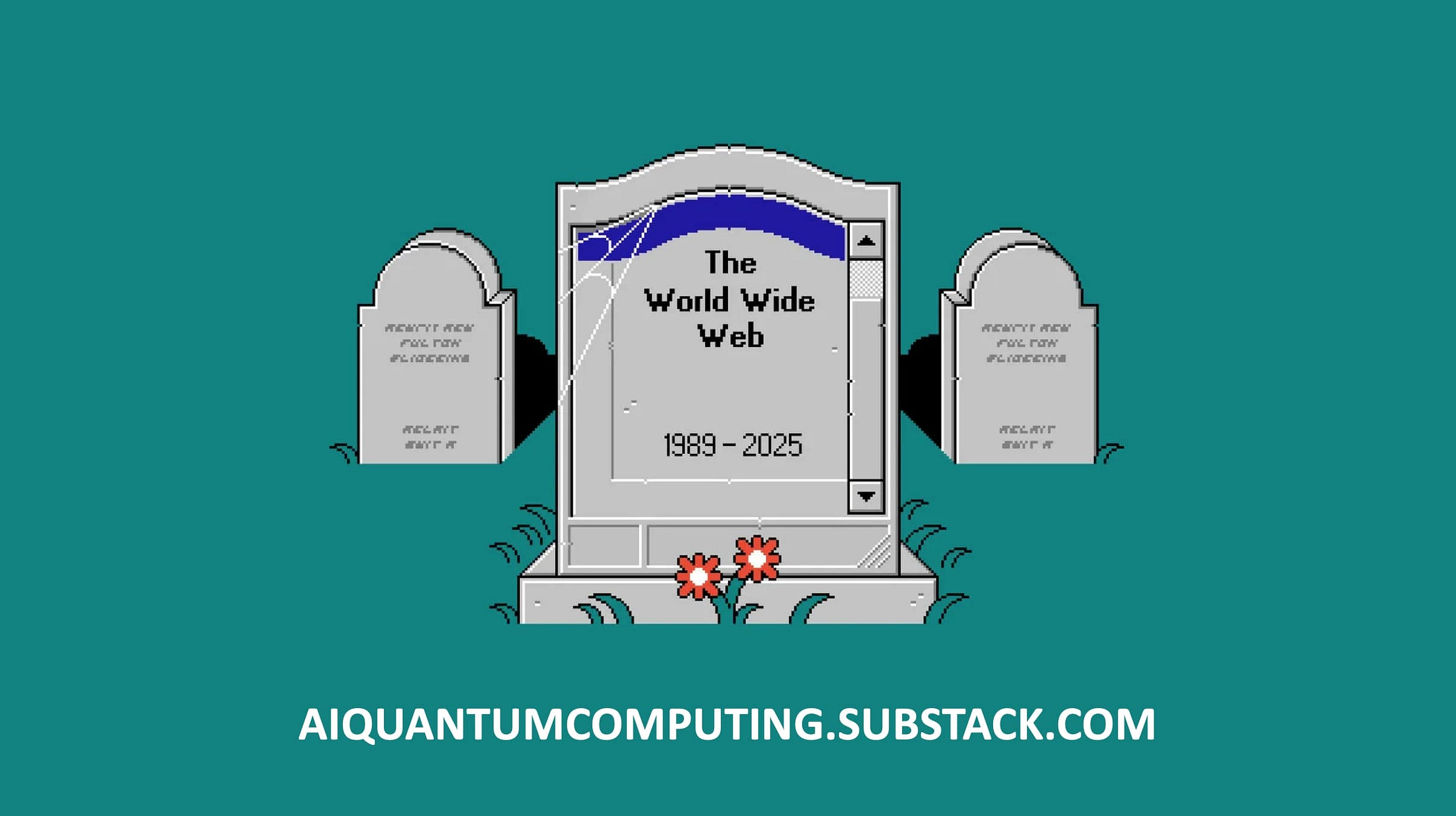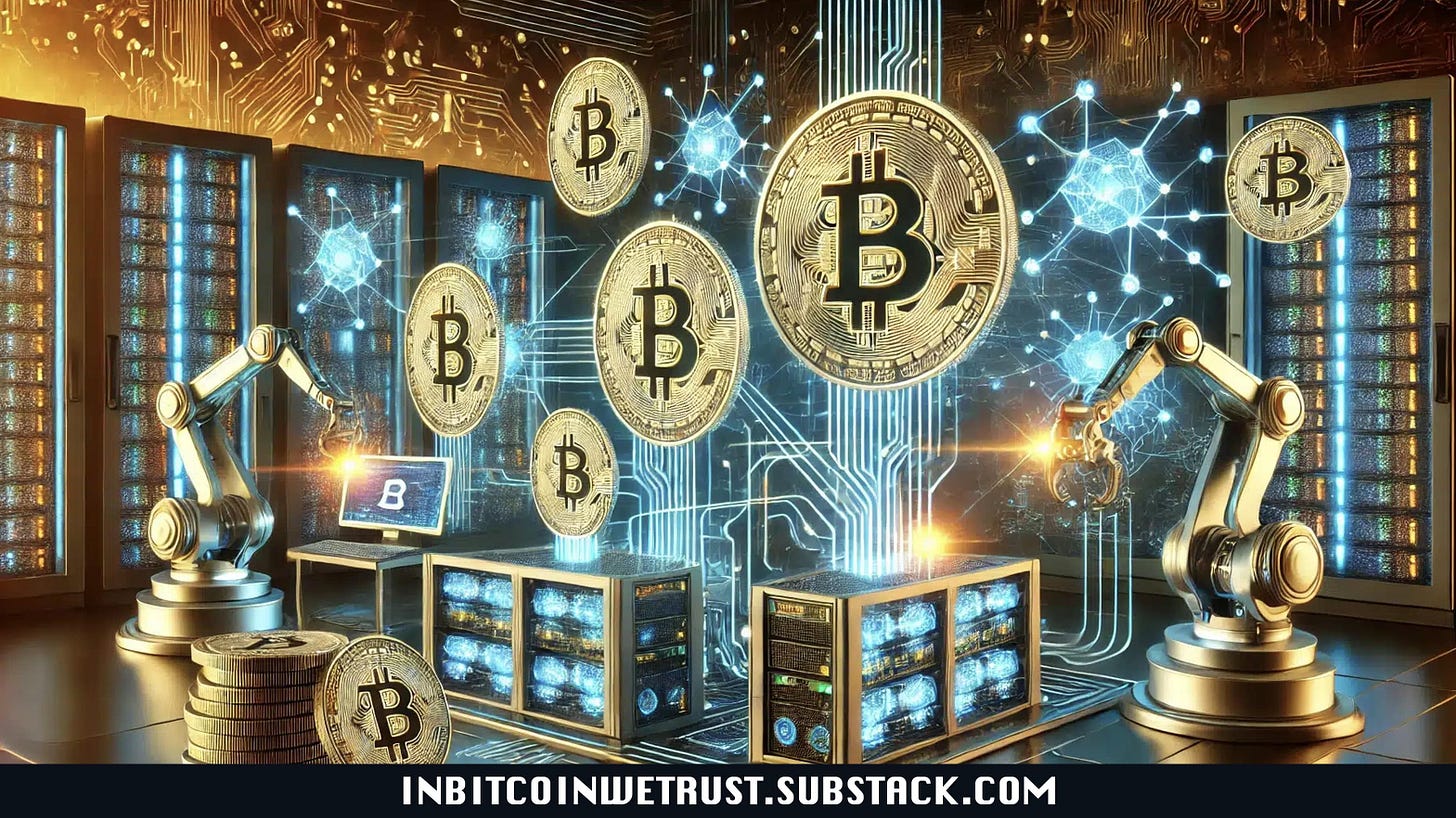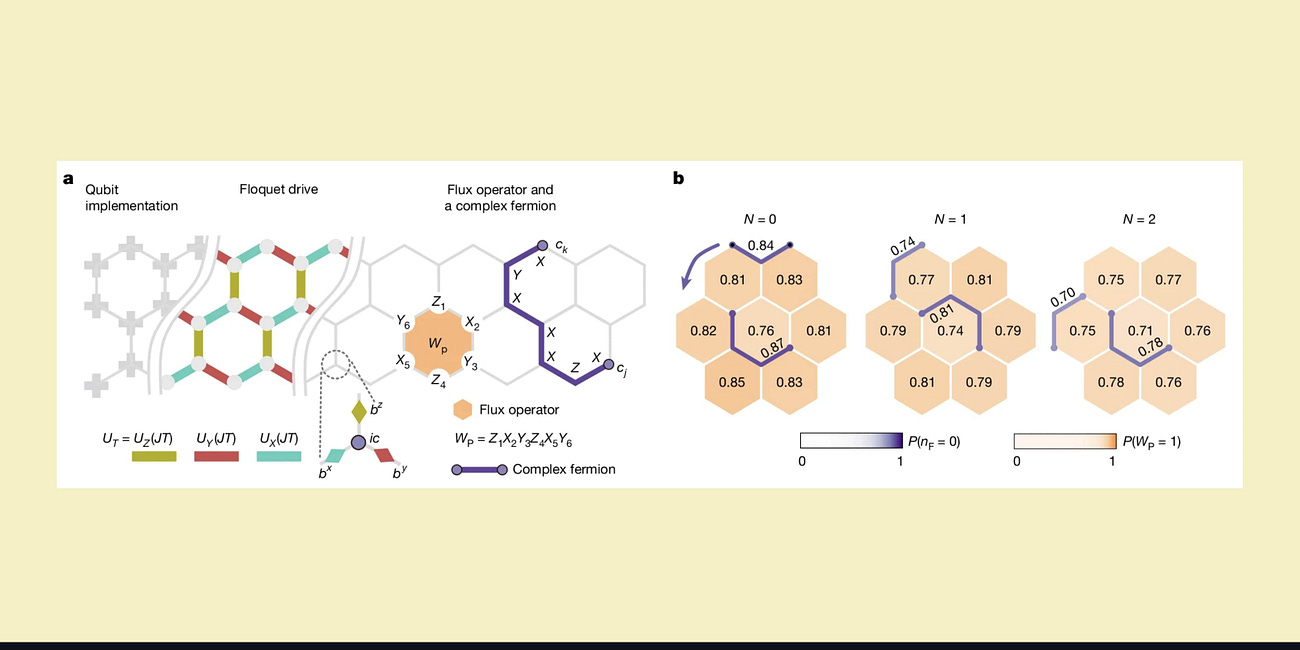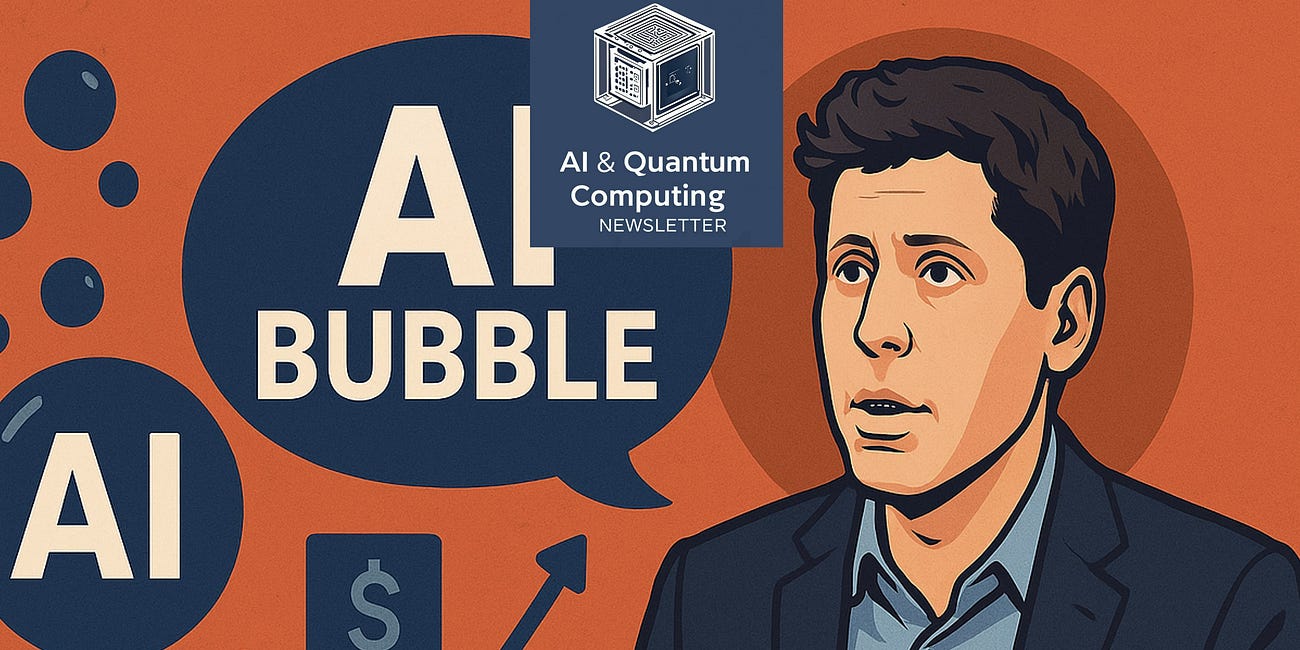AI Is Killing the Web, and We're Looking Away: Chronicle of a Death Foretold.
Do you hear that growing silence? It’s the sound of the web going dark.
Imagine the scene. Tomorrow morning, you wake up, grab your coffee, and open your laptop to check your favorite news sites, read a few blog posts, or browse a niche forum. But instead of the familiar content, you find only blank pages, 404 error messages, and the deafening silence of a digital graveyard. Ninety percent of the web you knew has simply vanished. A dystopian nightmare? Not according to Matthew Prince, the CEO of Cloudflare, a company with a front-row seat to this catastrophe, as it manages nearly 20% of the world’s entire web traffic.
In a series of recent, shockwave-inducing interviews, Prince isn’t just sounding the alarm; he is describing, with surgical precision, the live collapse of the economic model that allowed the web to thrive for a quarter-century. That model, that tacit pact, was beautifully simple: millions of creators, journalists, and enthusiasts produced content. In return, Google and other search engines indexed this content, analyzed it, and sent a steady stream of visitors to these sites. This traffic was then monetized, most often through advertising, creating an ecosystem where, in theory, everyone won. It was a virtuous cycle that allowed the web to grow, diversify, and become the largest repository of human knowledge and creativity in history.
Except that this pact, once almost symbiotic, has just been shattered. And the explosion is deafening.
Bitcoin and the Unseen War for Your Future: Jeff Booth Exposes the AI-Fueled Collision of Two Worlds.
You’re standing at a fork in the road of history. Which path you choose will determine not only your own future, but the future of the world.
From Partnership to Pillage: The Arithmetic of the Apocalypse
To understand the scale of the disaster, you have to look at the numbers, and they are unforgiving. A decade ago, the relationship between creators and Google was balanced. For every two pages that Google’s bot crawled on your site, it sent you, on average, one visitor. A fair trade: you provided the raw material, and Google gave you visibility. A 2-to-1 ratio.
Today, that ratio has already deteriorated dramatically. Google now needs to analyze six of your pages to deign to send you a single, solitary click. The cost for the creator has tripled for a benefit that is stagnating or diminishing. But this was only the beginning of the slide. What Google started, the new players in generative AI are pushing to an apocalyptic extreme.
The data from Cloudflare, which sees the requests from every bot on the web, is chilling. The ratio for OpenAI, the company behind ChatGPT, is not 6-to-1, but 1500-to-1. Yes, you read that correctly. ChatGPT vacuums up 1,500 pages of your content, feeding on it to refine its models and learn how to answer its users’ questions, and in return, it generously sends you... one visitor. And that's not the worst of it. For Anthropic, the creator of the Claude chatbot, the ratio reaches staggering heights: 60,000 pages crawled for a single click.
This is no longer crawling; it’s industrial-scale pillaging. A massive, one-sided extraction of value where the resource is you, your work, your expertise, your creations. And this resource is being consumed down to the bone, with no form of compensation. Matthew Prince's verdict is final: “If content creators can’t derive value from their work, they are going to stop creating original content.”
And the conditional tense is no longer necessary. It’s already happening. Consolidated data shows a dizzying 55% drop in search engine traffic to websites between 2022 and 2025. Even illustrious names are not spared. Giants like The Washington Post and HuffPost have seen their organic traffic—the kind that comes from searches—cut in half in just three years. For every titan that stumbles, how many thousands of small blogs, independent sites, and passionate forums have already disappeared in silence?
Google, the Unwitting Gravedigger
The cruelest irony in this story is that Google, the architect of the old web, has become one of the main agents of its destruction. In its frantic race not to be outdone by OpenAI and others, Google is turning its own search engine into a dead end. Prince reveals a stunning figure: six months ago, even before the massive rollout of its new AI features, 75% of Google searches ended without a single click to an external site. The user asked a question, Google displayed a “featured snippet” or a “knowledge panel,” and the session ended there.
With the high-profile launch of “AI Overview,” the feature that uses AI to generate a direct and comprehensive answer at the top of the results page, that number could reach, or even exceed, 90%. Google is no longer a treasure map pointing you to links to explore; the AI gives you what it believes is the treasure directly, making the journey unnecessary. The virtuous loop has twisted into a death spiral: no more visits, no more traffic, no more ad revenue, no more reason to create content.
Predictions from the research firm Gartner confirm this underlying trend: the volume of traditional web searches is expected to fall by 25% by 2026. An entire generation is already forming new habits. Among 18- to 24-year-olds, 66% already use ChatGPT to search for information. Only 69% still use Google. The gap is closing with breathtaking speed. The emperor has no clothes, and his kingdom is crumbling.
The Three Possible Futures (and None Are Good)
Facing this great collapse, Matthew Prince outlines three scenarios for the future. Brace yourself—none of them are optimistic.
The Nihilistic Scenario: This is the simplest, most brutal outcome. Lacking a viable economic model, all the independent journalists, researchers, bloggers, artists, and content creators “starve to death.” Those are his words. The web becomes a content desert, populated only by the ghosts of what once was and low-quality synthetic content generated by AIs in a loop.
The Neo-Feudal Scenario: In this version, creation doesn't disappear entirely, but it is completely centralized. Five or six AI mega-corporations (Google, OpenAI, Meta, Anthropic, etc.) become the new patrons, the feudal lords of the digital age. They directly employ all the valuable creators, not out of philanthropy, but to feed their own models. This is the end of editorial independence, diversity of voice, and a free press.
The Unknown Scenario: Humanity proves resilient and invents a brand-new economic model to fund creation on the internet. The problem? No one, absolutely no one, knows what that might look like today.
Cloudflare, for its part, refuses to stand idly by. Prince has drawn a first weapon: “AI Audit,” a tool that allows site administrators to block all known AI company bots by default. His justification is as simple as it is powerful: “I fight the Chinese, Russian, Iranian, and North Korean governments every day who are trying to hack our customers, and you're telling me I can't stop some nerd with a company in Silicon Valley?” He even proposes a more structural solution: resurrecting the HTTP 402 protocol code, originally intended for micropayments but never used, to implement a “pay-per-crawl” system. AI wants your data? It will have to pay for it. An attractive idea, but one likely to run up against the phenomenal lobbying power of the tech giants.
The Snake Biting Its Own Tail to Death
The creator economy, a thriving sector valued at $203 billion in 2024, is therefore directly on the chopping block. The paradox is absolute: a recent survey revealed that 84% of these same creators now use AI to improve their productivity, write their scripts, and generate images. In doing so, they are accelerating their own obsolescence, feeding the very beast that will devour them. It is the ouroboros of the digital age: AI feeds on human content to create synthetic content that replaces human content, which then has no reason to be created, thus depriving the AI of its future food. The very logic of the system leads to implosion.
The speed of the contagion is what is most frightening. In May 2024, Google officially launches AI Overview. By June 2025, just one year later, the percentage of news searches ending without a single click has jumped from 56% to 69%. A 13-point increase in twelve months. At this rate, by 2027, the external click will be an archaeological curiosity.
While publishers face an “existential threat,” as Prince puts it, the reactions are scattered. The New York Times has chosen the legal route, suing OpenAI. Reddit and many forums, aware that their conversations are a goldmine for training AIs, are transforming into “walled gardens,” restricting access to their data. The open, interconnected web is fragmenting into a multitude of besieged fortresses.
We are told of “Schumpeterian creative destruction,” an economic concept where innovation destroys old models to create new, more efficient ones. Prince himself uses this comparison. But this time, what is being destroyed is not just an industry; it's the connective tissue of the open web, the very idea that an individual can publish a piece of information or a creation and make it accessible to the entire world.
Meanwhile, the tech giants are preparing for the world that comes next. Meta launches its “Creator Monetization Suite” with great fanfare, promising new tools for creators. But the reality is less rosy: it’s mainly about locking them further into its ecosystem, making them dependent on its platforms, the better to digest their content and feed its own AI engine.
The conclusion is a bitter one. The very companies that built multi-trillion-dollar empires on the back of the web's free and open content are precisely the ones dealing it the final blow today. Google, which spent 25 years encouraging creation just to have something to index, is now the one turning off the traffic spigot with both hands.
“The internet as we know it will not survive in its current form,” Prince concludes. The choice we have left is a binary one. Either we accept a future where the web is controlled by a handful of mega-corporations that directly employ the creators deemed “useful,” or we fight to invent something radically new.
But let's make no mistake. The free, sprawling, sometimes chaotic but wonderfully diverse web that we knew is dying. And it's not coming back.
Do you hear that growing silence? It’s the sound of the web going dark. One site at a time. One blog at a time. One voice at a time. And all the while, the AIs continue to crawl, relentlessly. To digest. To regurgitate. Until there's nothing left to eat.
Welcome to the post-traffic era. Population: You and an army of chatbots.
Beyond Reach: How a Quantum Processor Unlocked a "Forbidden" Phase of Matter.
In the strange and counterintuitive world of quantum mechanics, there are phenomena so complex, so deeply entangled, that they lie beyond the horizon of our most powerful supercomputers. These are not merely difficult calculations; they represent entire realms of physics that, until now, have existed only in the abstract language of theoretical equation…
Google's AI Jackpot: How a $106 Billion Backlog Reveals a Profit Machine Already in Full Swing.
What was once seen as a feverish defensive maneuver is now a formidable offensive revenue-generating machine. Google’s foray into artificial intelligence, long considered a mere strategic response to the assaults of agile competitors like OpenAI and Microsoft, is proving to be a sophisticated revenue engine, already running at full capacity behind the s…
AI and the Specter of a Correction: Why Wall Street Could Soon Be Disenchanted.
Wall Street is living at the frantic pace of artificial intelligence. Driven by an almost mystical euphoria, the stock market has reached unprecedented heights, propelling a handful of tech giants to the rank of true economic deities. Nvidia, Microsoft, Alphabet, Meta: these names are on everyone's lips, their quarterly performances scrutinized like mod…






"Among 18- to 24-year-olds, 66% already use ChatGPT to search for information. Only 69% still use Google."
Just checking: Is there a typo in those figures? Because they suggest that 2/3 of Zoomers are still using Google, even as they use GPT in parallel.
Is your point that 31% of Zoomers have completely ditched Google in just 2.5 years?
This all presupposes that nothing changes in the AI landscape, and it almost certainly will. Open AI has been very clear they lost money on every $200/mo Pro license. That's okay while they're burning through investment funding, but this is simply the first phase of enshittification. The other stages are coming, fast.
We can expect to see huge increases in monthly fees in coming months, ads, your personal data for sale to the highest bidder, and of course paid placements. Heck, for all we know chat bots won't even tell us what's a real answer and what's just a paid placement.
I think what's far more likely to happen is that not a lot will change. Instead of Google being the gateway to a bunch of commercial sites who've paid for placement, Chat GPT or Grok or Claude will be the gateways to the same 20-30 massive commercial sites who can afford to buy placement. (The sites of the AI bots won't be the sources for all this crappy content, mind you, because their business model will be paid placement.)
And independent content creators? Please. That ship sailed over a decade ago.